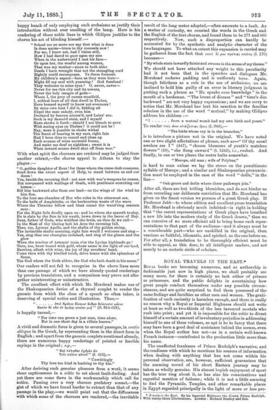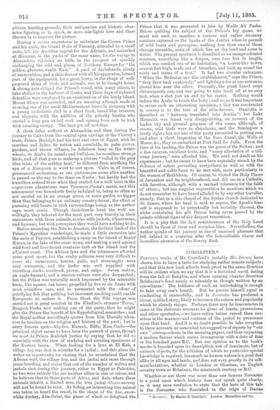ROYAL TRAVELS IN THE EAST.*
ROYAL books are becoming numerous, and as authorship is fashionable just now in high places, we shall probably see many more, for there is certainly no lack either of princes or princesses, and the public delights in ascertaining how great people conduct themselves under any possible circum- stances, and are quite surprised to find them possessed of the- same feelings and faculties as other men and women. The grati- fication of such curiosity is harmless enough, and there is really no reason why a Royal or Imperial Highness should not write at least as well as two-thirds of the less favoured mortals who rush into print; and yet it is impossible for the critic to divest himself of a certain amount of involuntary prejudice in addressing himself to one of these volumes, so apt is he to fancy that there may have been a good deal of assistance behind the scenes, even, when the Royal author has not—as in a certain well-known French instance—contributed to the production little more than. his name.
The unaffected frankness of Prince Rudolph's narrative, and the readiness with which he mentions his sources of information when dealing with anything that has not come within his personal observation, are, however, sufficient guarantees that the amusing record of his short Eastern journey may be taken as wholly genuine. His almost boyish enjoyment of sport has the true ring about it as has also his conscientious and regretful mention of failures ; while it is not a little amusing to find the Pyramids, Temples, and other remarkable places in Egypt regarded principally in the light of more or less pro-
• Travels in the Bast. By his Imperial Highness the Crown Prince Rudolph. With ninety-three Illustrations. London : Richard Bentley and Bon.
pitious hunting-grounds, their antiquarian and historic char- acter figuring, so to speak, as mere side-lights here and there thrown in to improve the picture.
During a severe snowstorm in midwinter the Crown Prince and his uncle, the Grand Duke of Tuscany, attended by a small suite, left the Austrian capital for the Adriatic, and embarked at Miramar, in the yacht of the same name, for the voyage to Alexandria, rejoicing no little in the prospect of speedily exchanging the cold and gloom of Northern Europe for "the golden, glorious, sunlit East." A pack of dachshunds, plenty of ammunition, and a skin-dresser with all his apparatus, formed part of the equipment, for a great booty, in the shape of well- prepared skins of birds and animals, was to be brought home. A strong gale obliged the Prince's vessel, with many others, to take shelter in the harbour of Zante, and three days of enforced detention were employed in an examination of the lovely island. Mount Skopo was ascended, and an amusing attempt made at coursing one of the small Mediterranean hares in company with a young ecclesiastic clad in a short frock, broad blue trousers, and slippers, with the addition of the priestly biretta, who carried a long gun at full cock and sprang from rock to rock with amazing energy. The hare got off scot-free.
A short delay sufficed at Alexandria, and then during the journey to Cairo from the central open carriage of the Viceroy's train, Prince Rudolph had his first real view of Egypt, with its marshes and dykes, its cotton and cornfields, its palm groves, gardens, and brown villages, its fellaheen busy at the water- wheels, its Arabs, its camels and buffaloes, its countless strange birds, and all that goes to make up a picture "veiled in the grey blue mists of the midday heat," so different from anything the eye of a European is wont to rest upon. Cairo is, of course, pronounced enchanting, as one picturesque scene after another is passed on the way to the Kasr-en-Nusha ; but hardly had the travellers arrived there when they started for a wolf hunt in the sugar-cane plantations near Toussoon Pasha's castle, and this amusement was henceforth freely indulged in, being as often as not carried on in an orange grove, or some garden no bigger than that belonging to an ordinary country-house, the effect of pursuing wild beasts in such surroundings being, as the author says, most comic. Though dachshunds hunt the wolf un- willingly, they behaved for the most part very bravely in their encounters with these animals, as also with jackals, ichneumons, and hyaenas; but with porcupines they would have nothing to do.
Before ascending the Nile to Assonau, the farthest limit of the Prince's Egyptian wanderings, he made a little excursion into the oasis of Fayoom, establishing a camp on the island of Bezir6 Karlin, in the lake of the same name, and making a raid against wild fowl and four-footed creatures both on the island and the adjacent coast. The African lynx and the ichneumon afforded some good sport, but the crafty pelicans were very difficult to come at; cormorants, herons, gulls, and river-eagles were very numerous, and the larder was well supplied with countless ducks, woodcock, plover, and snipe. Seven wolves, an eagle-buzzard, and a carrion-vulture were also despatched ; but the Prince was naturally much impressed by the miserable boats, like square, flat boxes, propelled by five or six Arabs with most primitive oars, and so permeated with the odour of pntrifying fish that nothing but incessant smoking could enable Europeans to endure it. From Siout the Nile voyage was carried out in great comfort in the Khedive's steamer Feruz,' Brugsch Pasha now making one of the party, that he might give the Prince the benefit of his Egyptological researches ; and the Royal author accordingly quotes from him liberally when- ever he touches on the religion and history of the past ; but in every famous spot—Abydus, Karnak, Edfu, Kom Ombo—the principal object seems to have been the pursuit of game, though we must do Prince Rudolph justice by saying that he did so especially with the view of studying and securing specimens of the Eastern fauna. When looking for a lynx at El Ka.b, a village dog was shot in mistake for a jackal ; and this gives the writer an opportunity for stating that he ascertained that the African wolf, the village dog, and the jackal mix races through cross-breeding, and states that out of the number of wolves and jackals shot daring this journey, either in Egypt or Palestine, no two were entirely like one another either in size or colour, and
he believes that in those parts of Africa and Asia where these animals inhabit a limited area, the true jackal (Canis aureus) will not be found to exist. At Sohag, an interesting live animal was taken on board the vessel, in the shape of the fine, snow- white donkey, Abu-Gebel, the paces of which so delighted the
Prince that it was presented to him by Mudir All Pasha. Before quitting the subject of the Prince's big game, we must not omit to mention a carious and rather uncanny creature captured on the banks of the Jordan when in pursuit of wild boars and porcupine, nothing less than one of those strange varanidre, some of which live on dry land and some in water. The present specimen is described as an orange-coloured creature, something like a dragon, over four feet in length, which was smoked out of its habitation, "a beaver-like tower, several feet high, made out of branches, and built up round the roots and stems of a tree." It had two circular entrances. "When the Bedouins saw this establishment," says the Prince, "they drew back cautiously," and lighting a fire at one entrance, posted him near the other. Presently, the great lizard crept circumspectly out, and was going to take itself off at an easy trot, when a shot put an end to his career. Nothing would induce the Arabs to touch the body ; and so, as it was important to secure such an interesting specimen, a bier was constructed to convey it to the tent of the skin-dresser. Damietta is described as "Antwerp translated into Arabia "; but Lake Menzaleh was found very disappointing, on account of the leaden sky and general greyness of the scene, although, of course, wild birds were in abundance, and the flamingoes a lovely sight ; but not one of the party succeeded in getting one, and after a short inspection of the Suez Canal, the Wells of Moses, &c., they re-embarked at Port Said for Jaffa. From the time of his landing, the Prince was the guest of the Sultan ; and a fine caravan, excellent tents, and "every alleviation of a toil- some journey," were afforded him. We need not dwell on his experiences ; but he seems to have been espec,ially struck by the richness of colour prevailing everywhere, as well as with the beautiful and noble faces to be met with, more particularly in the women of Bethlehem. Of course, he visited the Holy Places at Jerusalem and its neighbourhood, and did so, as a Catholic, with devotion, although with a marked tolerance for the faith of others ; but one singular superstition he mentions which we do not remember to have heard alluded to by any other traveller, namely, that in a side-chapel of the Syrian church dedicated to St. James, where his head is said to repose, the Apostle him- self is supposed to be perpetually but invisibly throned, the niche containing his gilt throne being never passed by the priests without signs of the deepest veneration.
It is a pity that the last reminiscences of the Holy Land should be those of fever and scorpion-bites. Nevertheless, the author speaks of his journey as one of unmixed pleasure that left behind it a yearning after the indescribable charm and boundless attraction of the flowery East.



































 Previous page
Previous page